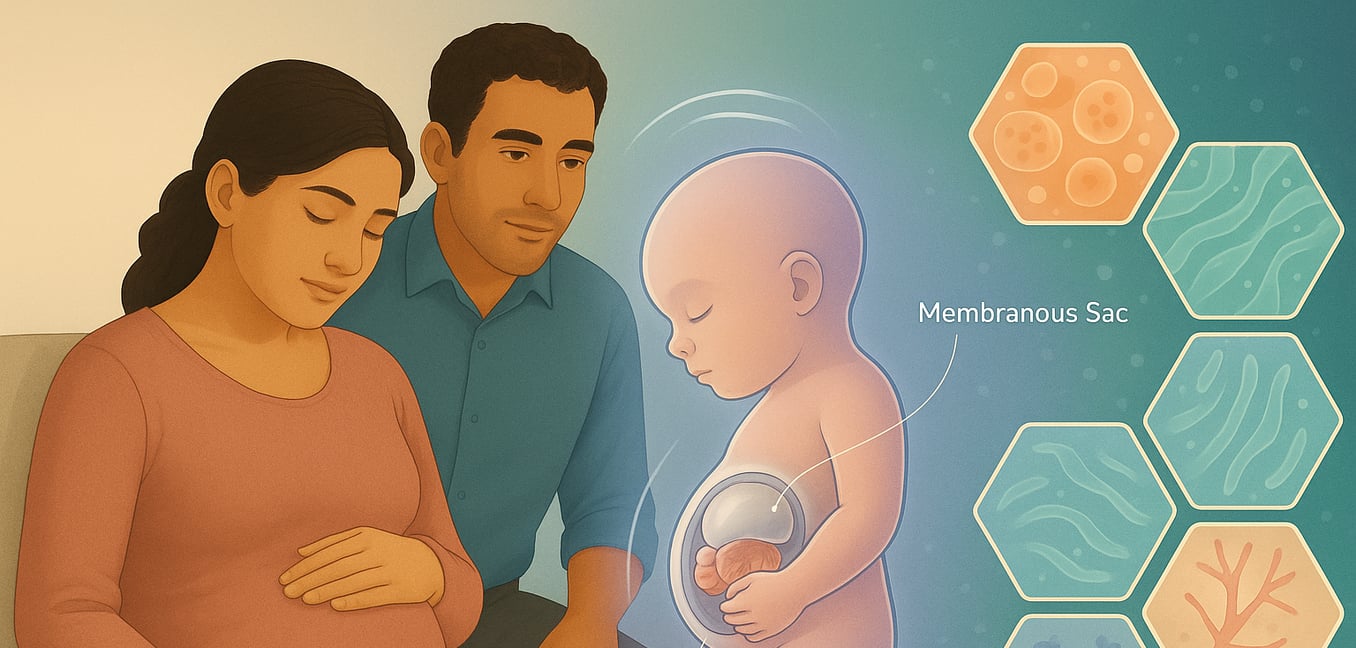A Life-Altering Diagnosis: Understanding Omphalocele
Omphalocele is a rare condition present at birth where some of an infant's abdominal organs, such as the intestines and liver, protrude through an opening at the base of the umbilical cord. These organs are covered by a thin, protective sac, a key feature that helps doctors distinguish it from similar conditions where there is no protective covering.
Most families first learn of the diagnosis during a routine prenatal ultrasound. This early detection is a double-edged sword: it allows medical teams to prepare for a high-risk delivery, but it also marks the beginning of a long and emotionally challenging journey for parents. Because omphalocele can be associated with other health issues, the diagnosis often triggers further tests to check for underlying genetic or chromosomal conditions. This waiting period adds another layer of stress, abruptly shifting a family's focus from joyful anticipation to navigating fear, uncertainty, and complex medical care.
The Initial Shock: First Reactions to the Diagnosis
Receiving an omphalocele diagnosis, whether during pregnancy or at birth, is a life-altering moment that triggers a wave of complex emotions. Parents are suddenly thrust into a world of medical uncertainty that feels both frightening and isolating.
- Overwhelming Shock and Fear: The diagnosis is often the first time parents have ever heard of omphalocele. This unfamiliarity, combined with deep concern for their baby's survival, creates profound shock and anxiety.
- Feelings of Guilt and Self-Blame: It is common for parents to search for a cause, wondering if they did something wrong during the pregnancy. These feelings of guilt are a natural, though unfounded, part of trying to make sense of a rare condition.
- Grieving the Expected Path: Parents often grieve the loss of the uncomplicated pregnancy and "healthy" baby they had imagined. This is not a reflection of their love, but a normal response to a future that has suddenly and dramatically changed.
- Different Coping Styles: While both parents feel the shock, fathers may feel societal pressure to be the "strong one." This can lead them to suppress their own fear and grief to support their partner, which can create a sense of isolation even within the relationship.
Navigating the Wait: The Emotional Journey During Pregnancy
After the initial crisis of the diagnosis, the pregnancy becomes a dynamic period of adaptation, worry, and preparation. This emotional journey is not a straight line but fluctuates with new information and the approaching reality of birth.
- A Shift from Crisis to Chronic Concern: As parents attend specialist appointments and learn more about the treatment plan, the initial post-traumatic stress often subsides. The shock evolves into a more manageable, though persistent, state of worry.
- The Anxiety of New Information: The emotional state of parents can rise and fall dramatically with each new test result. The waiting periods for genetic screening or detailed scans are times of intense anxiety, while clear information can provide a sense of relief and control.
- Emotional Avoidance as a Coping Tool: Many parents consciously try not to dwell on the baby's condition to get through daily life. This is not detachment but a protective strategy to manage the ongoing stress of a high-risk pregnancy.
- Resurgence of Anxiety Before Birth: As the due date nears, it is common for both parents to experience a new wave of anxiety and depressive symptoms. The focus shifts from the diagnosis itself to the tangible realities of a high-risk delivery, a planned NICU stay, and upcoming surgeries.
A Call for Support: Why Family-Centered Care is Essential
The profound psychological impact of an omphalocele diagnosis highlights the need for care that extends beyond medical procedures. A family-centered approach addresses the emotional, social, and practical challenges parents face from the very beginning.
- Integrated Mental Health Support: Proactively offering mental health resources to both parents is critical. This validates their emotional experience and provides them with coping strategies to build resilience for the long journey ahead.
- Peer-to-Peer Connection: Connecting families with "expert parents" who have lived through this experience provides invaluable empathy and practical advice. This peer support reduces isolation and offers a tangible sense of hope that clinicians alone cannot provide.
- Practical and Financial Guidance: The emotional strain is often worsened by practical stressors. Support in navigating insurance, managing medical costs, and handling time away from work can alleviate a major source of anxiety, allowing parents to focus on their child and their own well-being.










